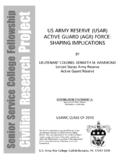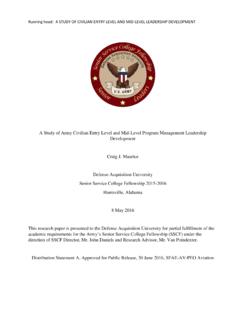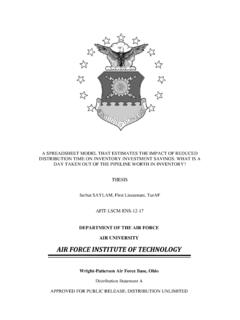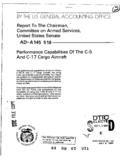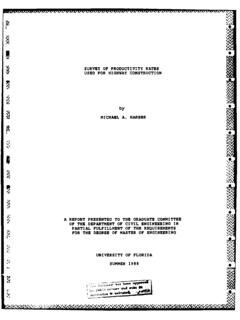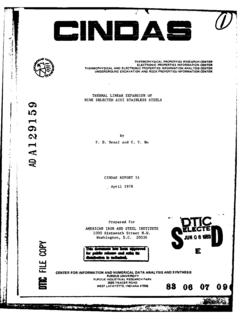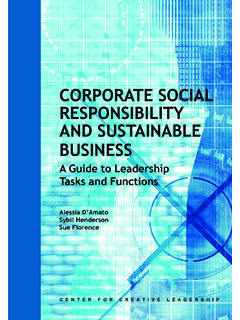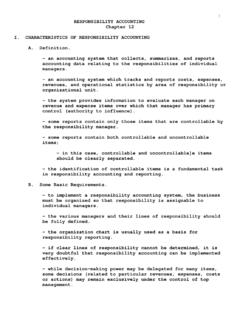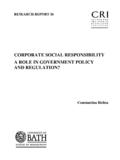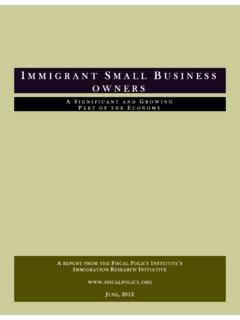Transcription of WHAT DO THE ‘BEST’ COMPANIES DO?
1 CORPORATE SOCIAL responsibility AND EMPLOYEE VOLUNTEERISM: what DO THE best COMPANIES DO? Cynthia S. Cycyota, * United States Air Force Academy HQ USAFA/DFM 2354 Fairchild Drive, Suite 6H-130 USAF Academy, CO 80840 719-333-2341 Claudia J. Ferrante, United States Air Force Academy HQ USAFA/DFM 2354 Fairchild Drive, Suite 6H-130 USAF Academy, CO 80840 719-333-9710 Jessica M. Schroeder, MPP United States Air Force Academy HQ USAFA/DFM 2354 Fairchild Drive, Suite 6H-130 USAF Academy, CO 80840 719-333-9713 *Corresponding Author The opinions expressed in this manuscript do not represent the opinions or views of the United States Air Force or the Department of Defense. what the best COMPANIES Do 1 CORPORATE SOCIAL responsibility AND EMPLOYEE VOLUNTEERISM: what DO THE best COMPANIES DO? ABSTRACT: Employee volunteerism as a practice of corporate social responsibility aids corporations by strengthening employee satisfaction and retention internally and by strengthening corporate reputations and connections with stakeholders externally.
2 Of particular interest are the specific practices and procedures used by COMPANIES to encourage and support volunteer activities of employees. We reviewed publicly available documents of Fortune s 100 best COMPANIES to Work For ranking to gain insight into how these best COMPANIES practice employee volunteerism and whether they link employee volunteerism to their corporate social responsibility strategy. We propose a connection of the position and importance of employee volunteerism in the corporate practices of social responsibility . Our findings suggest that many highly regarded COMPANIES specifically linked employee volunteerism to their corporate social responsibility strategy. These COMPANIES also utilized similar practices to encourage and support employee volunteerism. We highlight the practices that managers may consider to support their corporate social responsibility efforts offer several suggestions for future consideration.
3 Key Words: Corporate Social responsibility ; Employee Volunteerism; Stakeholder Engagement; Corporate Reputation; Community Involvement; Organizational Citizenship Behavior. what the best COMPANIES Do 2 1. VOLUNTEERISM - INSIDE AND OUTSIDE THE ORGANIZATION Volunteering by employees of corporations is an important component of attracting and retaining employees as well as a strategic component of corporate reputation and performance. Many COMPANIES , including 90 percent of Fortune 500 COMPANIES , have employee volunteer programs that support and subsidize employee volunteer activities and community outreach on company time (Points of Light, 2006; Rodell, 2013). Volunteerism is an opportunity for firms to address the demands of stakeholders, contribute to the concerns and interests of the community as well as provide opportunities for employee engagement and encouragement to senior organizational leaders to imbed socially responsible behavior within core businesses (Clarke & Butcher, 2006).
4 Employers support for employee volunteering is both noteworthy and compelling, and it gives rise to additional questions. Wilson (2000) identified the lack of attention paid to the contextual effects of volunteering, to include the impact of community, organizational, and regional characteristics on the decision that an individual employee makes to volunteer. It is also necessary to consider the relevant dynamics between the actions and attitudes of the employee pressuring for policies that facilitate employer sponsored volunteerism and the attitudes and reactions of the internal and external audience. Research has clearly called for more attention to be paid to the business context and the broader environment in which employer sponsored activities are occurring (Van der Voort, Glac & Meijs, 2009) along with the many facets of CSR (Janssen, Sen, & Bhattacharya, 2015). We contend the full range of potential benefit from employee volunteerism has not been fully explored and specific links between employee volunteerism and a firm s corporate social responsibility strategy has not been studied.
5 what the best COMPANIES Do 3 Employee volunteerism is often linked to corporate social responsibility (CSR); however, we believe volunteerism should be considered as a distinct and unique component of CSR that can provide the opportunity to link the macro (external) efforts of a corporation to strengthen corporate reputation and create community-based support with the micro (internal) benefits of employee engagement and satisfaction in a multi-level approach (Aguinis & Glavas, 2012). Taken together, these elements represent a well-balanced public sphere wherein employees are able to actively support public concerns while simultaneously improving the reputation and outreach of the company (Andrews, 1987). The compelling questions become how do corporations deploy the concept of employee volunteerism, and do they intentionally include it as part of their CSR strategy for the firm. We explore the employee volunteerism practices of highly regarded firms and examine the relationship between explicit company association of employee volunteerism with CSR and how they convey the practices to stakeholders.
6 We review the volunteerism literature related to our questions, explore the internal and external benefits COMPANIES reap by encouraging employee volunteerism, and explain our methodology and results. We conclude with outlining several opportunities for organizations interested starting or improving their employee volunteer programs (EVPs). 2. what DO WE KNOW ABOUT EMPLOYEE VOLUNTEERISM? Definition of Employee Volunteerism We define employee volunteerism in a manner consistent with McGlone, Spain, and McGlone (2011): the deliberate and active giving of one s time, energy, skills, or talents to a charitable organization without receiving payment in return; employer-supported volunteerism is defined as active support through a variety of means for employees volunteering with charitable what the best COMPANIES Do 4 organizations. We have not deemed monetary or material charitable contributions an act of volunteering, and have focused rather on the giving of one s time, energy, talent, skills, etc.
7 As supported by the employer as defining employee volunteerism. This is supported by the three key components of individual or private volunteerism laid out by Rodell (2013): (1) it is an active giving of time and/or skills rather than more passive support through monetary donations (Musick & Wilson, 2008), (2) it is a planned activity as opposed to a reactive act of helping (Clary & Snyder, 1999), and (3) it occurs in the context of a volunteer or charitable organization (Musick & Wilson, 2008). Internal Benefits of Employee Volunteerism Motivation, Skill Development and Satisfaction Understanding the motivations and attitudes behind volunteering is integral to sustaining an organizational culture conducive to corporate social responsibility engagement. At the employee level, motivations found for volunteering include altruism, meaningfulness, organizational citizenship, role variety, relational and social task characteristics, networking and personal.
8 One motive, altruism, surfaced for more than 50% of participants in one study conducted (Pajo & Lee, 2011). Similarly, Peloza and Hassay (2006) found that volunteerism is motivated by either the employee s desire to help his/her employer, to help others, and/or to help him/herself. The attitudes and motivations toward CSR are especially evident in the Millennial generation, defined as the population born between 1980 and 2000 (McGlone, Spain & McGlone, 2011). The Cone 2006 Millennial Case Study revealed that 61% of Millennials felt personally responsible for making a difference in the world, and the majority (79%) wants to work for a company that cares about how it contributes to society. In fact, 69% of Millennials what the best COMPANIES Do 5 would refuse to work for a company that is not socially responsible (Cone, 2008). The very act of corporations communicating how CSR is linked to an organization s strategic plan impacts its ability to attract and keep members of the Millennial generation as employees.
9 McGlone, Spain & McGlone (2011) found students were more likely to want to work for a company after hearing its top executives discuss how the firm integrated CSR into its strategic plan compared to their attitudes before the presentation of this information. Peloza, Hudson and Hassay (2009) found that employees egoistic and organizational citizenship behavior motives, as well as their attitudes toward volunteerism, were all positively related to employees attitudes toward participation in volunteer activities. The impact of acquiring skills through volunteering activities has been shown to spill over into the employee s perception of his or her organizational job. Booth, Park and Glomb (2009) determined that volunteer hours predict employee perceptions of skill acquisition, and such perceptions are positively related to perceptions of job success and employer recognition. In fact, reports of acquiring one unit of skills increases the likelihood of reporting being recognized by the employer by 12% and the likelihood of reporting feeling successful on the job by 43% (Booth, Park & Glomb, 2009).
10 In addition, for every additional 100 volunteer hours, they found that the number of reported skills acquired increased by 17 percent. Depleted task, social and knowledge characteristics of jobs are a reality in many organizations, but volunteer project characteristics can compensate for these depleted job characteristics. Employee volunteer activities can be approached as a substitute for enriched jobs (Grant, 2012). Firms also reap the benefit of new skills acquired by volunteers during volunteering opportunities. Research shows that employees hours of volunteering are positively related to an increase in skills acquired from those experiences (Booth, Park & Glomb, 2009), what the best COMPANIES Do 6 which employees can then reinvest in their regular work role. Other benefits of organizational volunteerism for the firm include increased efficiencies and morale/team building (Peloza & Hassay, 2006). In short, employees positive feelings (such as those related to recognition, success in the job, job enrichment, efficiency and morale building) directly impact their satisfaction with the job and their organization.

